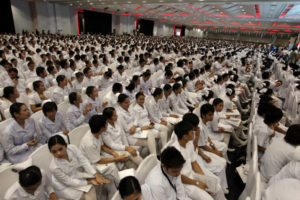 In 2016, former President Benigno Aquino III vetoed a proposed bill that could have potentially raised the monthly minimum wages of nurses from $153.82 to $480.58. House Bill Nos. 6411 and 2720 titled “An Act Providing for a Comprehensive Nursing Law towards Quality Health Care System, and Appropriating Funds Therefor” met an untimely end when Aquino cited “dire financial consequences” as the reason for the veto. In a statement, he explained that this bill would create a domino effect which not only affects the salary grades of other health professionals in the public sector but also other government employees in the hospital settings.
In 2016, former President Benigno Aquino III vetoed a proposed bill that could have potentially raised the monthly minimum wages of nurses from $153.82 to $480.58. House Bill Nos. 6411 and 2720 titled “An Act Providing for a Comprehensive Nursing Law towards Quality Health Care System, and Appropriating Funds Therefor” met an untimely end when Aquino cited “dire financial consequences” as the reason for the veto. In a statement, he explained that this bill would create a domino effect which not only affects the salary grades of other health professionals in the public sector but also other government employees in the hospital settings.
Since 2010, the Philippine Nurses’ Association has made efforts to convince Aquino to pass bills such as these. Aquino was adamant however and pointed out that the existence of Executive Order No. 201 has already raised the monthly minimum wages of nurse to $365.24. Furthermore, he added that nurses are provided different benefits under the Magna Carta of Public Health Workers.
Nursing as a profession in the Philippines demands too much time and energy without being properly compensated. Nurses have been leaving their hometowns to pursue greener pastures abroad. The number one reason why they leave is that they are never given enough. Aquino insists that this concern has already been met but employers work around this by hiring nurses on contractual basis. Doing so gives them the leeway to undercut salaries while still maintaining a full-time workload with extras in overtime.
Hospitals also circumvent the law by promising employment but only after completing a “training or probationary” period that often lasts between six months to one year. They stipulate that within such time, nurses would not receive any salary yet; instead nurses are given “cash allowances” that range from $1.92-3.84 per day.
Aside from the below minimum wage, Filipino nurses report the staggering amount of work and the abuse they receive from the people under their care.
Californian law states that the most patients a nurse should efficiently handle is six in departments such as post-partum care, general surgery, and psychiatric care. But a local paper in the Philippines, Sunstar, has reported that the nurse-to-patient ratio is actually a staggering two to forty-five as of November of 2017.
Around the same time, a video from Cebu City surfaced: a patient and her husband threatened a nurse for being unable to accommodate them. It escalated to a degree wherein the patient pointed fingers and called her derogatory names while the husband pulled the nurse’s ID. The video has since garnered thousands of views and angry reactions from netizens. The Cebu Chapter of the Philippine Nurses’ Association has condemned the couple and is seeking legal action against them. As of the moment, there hasn’t been any update with regards to this case.
This is only the tip of the iceberg when it comes to the daily struggles of a Filipino nurse. It is an age old problem that continues to plague the upcoming batches. Although there have been attempts at making them stay, the general consensus would rather find their future in countries beyond the Philippine Islands.
Ernesse Marie Berlin
Latest posts by Ernesse Marie Berlin (see all)
- Nursing as a PreMed Course - May 18, 2018
- Overworked and Underpaid: The Reality of a Filipino Nurse - March 28, 2018

